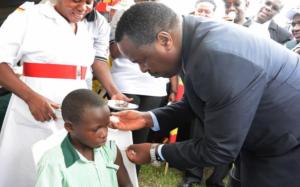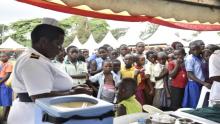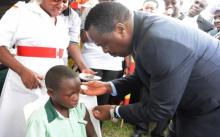Uganda launches Human Papillomavirus Vaccine
Kasese, 26th November 2015: Uganda launched the Human Papillomavirus Vaccine (HPV Vaccine) at Bwera Secondary School grounds, Kasese district. The Vaccine is meant to protect girls and women against cancer of the cervix.
Dr. Elioda Tumwesigye, Minister of Health who represented the First Lady of Uganda Hon. Janet Kataha Museveni as the guest of honour expressed his gratitude for this significant achievement. He said that 850000 children in Uganda were to be covered by the vaccination exercise and further affirmed government’s commitment to this exercise. Dr. Elioda also said that the government would apply WHO recommendations on cervical cancer control.
Pointing out cervical cancer as one of the leading causes cancers and causes of death among women world over, Dr. Elioda encouraged parents not to miss out on the ‘great opportunity’ of having their children immunized.
Dr. Elioda also stated that nearly half a million people surfer from cancer of the cervix and 300 000 women of die from cancer of the cervix every year. He further stated that, for every 100 women that suffer from cancer in Uganda, 80 of those suffer from cancer of the cervix.
He also stressed the risk factors of cervical cancer and one of them was sexual contact, especially unprotected sex with many partners and cautioned the people against irresponsible sexual behavior.
He further said that the primary prevention of cancer of the cervix is vaccination and all girls should be vaccinated. Dr. Elioda concluded his remarks by thanking government partners in health, World Health Organization for its rich technical advice, United Nations Children's Fund, PATH and the Immunization team at the Ministry of Health for a job well done.
Dr Jane Ruth Aceng, the Director General of Health Services, noted that this is a great stride by the Ministry of Health in providing HPV vaccine to all girls nationwide within the age of 9-13 years as recommended by WHO, and that the government has decided to begin with the cohort of 10 years.
She also mentioned that vaccines are provided free of charge, although she had learnt of some health workers who are charging for the vaccine but said that would be checked and called upon the population to alert the Ministry whenever the encounter any case of being charged for vaccines.
The host, Minister of Defense and Member of Parliament Kasese Municipality, Hon. Chrispus Kiyonga welcomed delegates to his region and thanked his community for the warm reception. He also thanked Ministry of Health for choosing Kasese district as the host to the launch of the HPV vaccine, calling on local leaders to ensure that the girls in the region are immunized.
Representing the Country Representative, Andrew Bakainaga, Country Advisor Immunization and Vaccines Development at WHO Country office delivered a joint statement on behalf of the United Nations Family. He congratulated Uganda upon the milestone and further said Human Papillomavirus (HPV) is the most common viral infection of the reproductive tract, saying “most sexually active women and men will be infected at some point in their lives and some may be repeatedly infected.”
Bakainaga further said that cervical cancer is by far the most common HPV-related disease with nearly all cases of cervical cancer attributable to HPV infection. He also pointed out that worldwide, cervical cancer is the fourth most frequent cancer in women with an estimated 530 000 new cases in 2012 representing 7.5% of all female cancer deaths and added that there are more than 270 000 deaths from cervical cancer every year. He further said that more than 85% of these occur in less developed regions.
He also highlighted the support WHO has provided to the government of Uganda by introducing cancer of cervix-screening in regional hospitals like Gulu, Arua, Soroti.
WHO recommends a comprehensive approach to cervical cancer control through the following means:
- WHO recommends vaccination for girls aged 9-13 years as this is the most cost-effective public health measure against cervical cancer
- HPV vaccination does not replace cervical cancer screening. In countries where HPV vaccine is introduced, screening programmes may still need to be developed or strengthened
- Education about safe sexual practices, including delayed start of sexual activity
- Promotion and provision of condoms for those already engaged in sexual activity
- Warnings about tobacco use, which often starts during adolescence, and which is an important risk factor for cervical and other cancers; and
- Male circumcision.
The event was well-attended by government officials, partners; WHO, UNICEF, Clinton Health Initiative (CHAI) and PATH, district leaders, religious leaders as well as school children who turned up in high numbers to get immunized.
____________________________________________________
For more information, please contact:
Mwebembezi Edmond, Public Information Officer, Tel: +256 414 335569, Cell: +256 782 962674, Email: mwebembezie [at] who.int (mwebembezie[at]who[dot]int)





